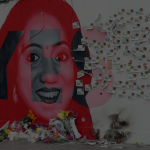by Jane X.
It was Mothers’ Day a few days ago, my “supposed due date” is coming soon, and I am here, thinking about mothers who have not brought their babies home, particularly women from minority backgrounds, like me, who tend to have bad experiences in Irish hospitals, worse even than their Irish counterparts. With my mother having passed away two years ago and losing my daughter in December last year after twenty-two weeks of pregnancy, Mothers’ Day was bound to have an impact on me. I am a mother now, even though I do not have a child. The events leading to my loss devastated me, and the treatment I received in an Irish maternity hospital has traumatised me.
I am a Brazilian who has been living in Ireland for the last twelve years. I received Irish citizenship last year – although I do not believe this to be particularly relevant, it felt worth mentioning before thoughts like “How come a migrant is complaining about the Irish system?” cross anyone’s mind. I pay my taxes just like any other person living in Ireland, including migrants.
The reason I am say this is that when I tweeted about Karen McEvoy’s death, and the treatment in maternity services in Ireland being apalling, my tweet was re-tweeted with the following quote: “go back to the dump you emanated from”. Let alone all the “impolite comments”, that I had to read. I believe that everyone deserves health care services of a good standard no matter where they come from. We should be critical and demand improvement – we pay taxes! I know this might shock some people but if I had health insurance in Brazil, there is no doubt that I would have received better care than I had here. While we turn a blind eye to the broken healthcare system in Ireland, a country with an advanced economy, nothing is going to change. Ireland has a legacy of institutional impunity and a history of women being repressed and controlled which still reflects on its health care system practices.
My Activism
I have been involved with MERJ – Migrant and Ethnic-Minorities for Reproductive Justice since the beginning. I remember our very first Abortion Rights Campaign march in 2017, followed by organising for the referendum, and canvassing in early 2018, etc. Once the referendum passed I felt drained. I was so tired of being fighting for “a seat on the table” during the Repeal the 8th campaign that I decided to take a break. Likewise, I am so tired of highlighting racism while a wider society lives in denial, since apparently “Ireland is not as bad as the US or the UK” and that should be enough for us?
Being a migrant activist in Ireland is exhausting. I see minoritites being excluded and talked over by people who have not lived our experiences. These people reach out to us for their research, treat us well and pretend to be our allies, but when it comes to meaningful discussions on strategy, they decide how to “advocate for those who are not cared for” in their own closed groups. We are taken for granted and treated as though we have no agency, while they use photos of women of colour to adverstise their events. Yes, they have never experienced the things they say they want to save us from – but we cannot dare to call them “white saviours”, or they will accuse us of dividing the movement. As if the feminist movement in Ireland was so inclusive – it is already divided!
Bearing this in mind, I would like to highlight that I acknowledge that the mistreatement of women in the Irish health care system is widespread and many Irish women have also suffered badly. However, women from minority backgrounds are even more vulnerable as they are discriminated against on different grounds such as ethinicity and social class. Please take a moment to think of the privilege a white heterosexual woman has over women from ethnic minority backgrounds: migrants, black women, and travellers; Not forgetting the experiences of LGBTQ+ and disabled women. Having acknowledged all of the above, I would like to share my story with you.
Cervical Incompetence
I lost my daughter twenty-two weeks into my pregnancy. I suffered a premature rupture of membranes (PPROM) which started slowly leaking amniotic fluid. I noticed something was wrong when I went to the toilet twice in a space of 10 minutes and then I saw a drop of what looked like water while I was getting changed. I was hospitalised for two weeks, and the final diagnosis was Cervical Incompetence or cervical insuficiency and an infection (contracted while I was in hospital). Cervical Incompetence can be treated with a cerclage (stitches) performed on the cervix between twelve and twenty-four weeks.
Cervical Incompetence is only diagnosed during pregnancy!!! I did not know that I suffered from it until I lost my baby. There needs to be proper checks performed between sixteen and twenty-five weeks of pregnancy. There are already groups campaigning for the introduction of more checks in antenatal care in the UK and the US.
I went to the emergency department twice during week twelve. I was bleeding on the first visit, and I could barely walk the second time. So, I asked for further investigation. The doctor told me that she could not take me out of work ( which was not what I asked for) because it was going to get worse by week twenty. No further checks were performed… And yes, I was hospitalised by week twenty, and lost my daughter in week twenty two.
“Geriatric mothers” & antenatal care
I have heard the term “geriatric mothers” for pregnant women over thirty-five years-old a few times. Although this term makes me feel extremelly uncomfortable, I expected that there would be extra checks in place for women in this higher risk category, rather than go through an antenatal care identical to what a twenty year-old woman receives! Since the very first scan at the hospital, when we were told that the heartbeat was not very clear, but nothing further was done to check it.
I realised that the antenatal care was just a box ticking exercise and so, I went to a private doctor for another scan to check that the baby was doing well.
The treatment at the maternity hospital
My experience of the maternity hospital was traumatic. Everything I was fighting against during the Repeal the 8th campaign happened to me. From discrimination in the maternity services to obstetric violence and misogyny. The Doctors could not have been more patronising. They talked to me as if I was a five-year-old child who could not understand English and therefore I could not dare to question them. I worked in hospitals in Brazil and I have always been proactive when it comes to my health – annual check ups, keeping my test results, looking for second opinions if needed, etc. Every time I asked them about my test results or I asked to talk to my obstetrician, who only showed up on the day of my loss, they would tell me “let me tell you the reason why we kept you here…” and never try to answer my questions. Then I would ask the midwives.
I saw so many faces, most seemingly “fresh-out-of-college” junior doctors who did not even know that a scan could be performed at my bedside, and I had to give directions about where to find the machine! I worked in a teaching hospital and also had a private patients’ floor, I can easily distinguish junior doctors from fully-trained. I too was an intern at one stage and we all have to start somewhere. Still, inexperienced professionals should be supervised, particularly when they have people’s lives in their hands!
I was shocked when I saw the wards. I was quite concerned about being admitted to a room with other five beds and toilets shared with the whole ward. This after being prescribed antibiotics to prevent infection. I was sad to realise that I was going to stay hospitalised for a few weeks in that place. I could not believe that this hospital was in an EU country. I was shocked to realise that even if a person pays health insurance, she will have to share a room with other five women, including those coming back from surgery. If she is a private patient she might have a room of her own but the care is usually the same – understaffed nurses and midwives, working with too few resources, and trying to repair what the junior doctors are not fully-prepared to handle!
I wrote a letter of complaint while I was in the hospital. I could not accept those “2 minute-visits” by junior doctors who had never even read my chart, and their next appointment was always more important than mine. Apart from the female doctor who admitted me and one other caring doctor, also a woman, most of the doctors were not clear on what they were doing and what they were telling me was confusing and worrying as a result.
“What happened to “that lady” in Galway is not going to happen here”
On the evening I lost my baby, the obstetrician finally showed up in the morning. I was led to believe that having the bed titlted would “fight against gravity”. Then I could try to hold for two more weeks. On that day I saw the obstetrician and the Neonatal chief…
The fluid and the blood were stagnating in my hips while the infection that I had contracted two days earlier was extremelly high and nobody wanted to tell me my test results. As I kept asking the obstetrician about the infection he said: “We are going to act if something is going wrong. What happened to “that lady in Galway” is not going to happen here”.
I had been at so many vigils to remember Savita Halappanavar. I was happy and worried when I found out I was pregnant in Ireland. I had cried in front of the mural with her photo on the Friday the referendum passed. I thought the Irish health care system would have improved…
Things escalated that evening – the umbilical cord came out while I was using the commode, and then “placed back” by a junior doctor who scanned me three times in the space of an hour and a half, as we asked him back every half an hour, and said that the baby was already on my pelvis: “but there’s still a heartbeat” and left the room without telling us was what was going to be done next…
I remembered Savita Halappanavar … Miss Y… Bimbo Onauga… Malak Thawley… and I thought of so many others who might have endured this system but did not make the headlines. I remembered the Maternal Death Enquiry report (2015) which says that 40% of maternal death in Ireland are migrants when we only account for 17% of the population.
Losing my child & the vaginal tear
I was feeling weak, the cramps which turned out to be contractions, were getting worse. I did not want to tell my husband and my sister that I was afraid I was going to die there. I had been asking to be brought to the delivery room and to have a Neonatal doctor present as my baby was still alive.
The “there’s still a heartbeat” sentence reminded me of my activism with MERJ around the Repeal the 8th campaign, but although the referendum had passed, it would not come into effect until 2019, and migrants would probably have to fight to be heard – as usual! In the meantime I was there trying to convince the doctors to do something and to gather more information about what was happneing to my OWN body, while I was on that tilted bed afraid to ask for the commode again and in case I delivered my baby there.
I had to pressure the doctor while I was under a lot of pain and stress. And I also pressured the midwife, who was sensible about it. I could not picture myself going through that situation for much longer. Unfourtunatelly my daughter lived for only one hour and twenty-five minutes. It was the hardest moment of my life to hold her knowing that she was not going to make it…
Then when I thought I had been through enough, I had two doctors, a female and a male sticking their hands inside of me in an attempt to remove the placenta manually – which resulted in a tear, not caused by a surgical instrument, but by doctors’ hands – my baby was only 500g, and she was already already out! The pain was nearly unbearable. I felt violated…
The “perineal repair” as they called the stitches, would leave me me unable to sit properly for over a week. Yet, I still needed to be sent to the operating theatre to remove the rest of the placenta.
While in the lift up to the operating theatre I watched two doctors disagreeing about the type of anaesthetics I was going to receive. I could not believe that my life was in their hands and “ the wrong anaesthetics would spread the infection to my spine and to the rest of my body”. As the obstetrician would tell me when I asked him at the follow up appointment.
Follow up appointment at the Baby Clinic!!!???
I stayed in hospital for three days after losing my daughter, to keep the infection under control and I continued to take antibiotics for a week after being discharged. I was told that an appointment was going to be arranged for six weeks time. Nonetheless, I had to remind them that I wanted a follow up appointment, when I also had to ask to have a scan. The scan was booked for 3 months ahead and then I gave up and I went to a clinic to be checked. The follow up appointment was divided into two parts. The first part was to talk to the Neonatal doctor – at the Baby Clinic!!!??
About an hour before the appointment we were told to go to the Baby Clinic. I did not want to believe that they would make us stay there, as they have a bereavement team, which should be mindful of parents going through loss and grieving. So, I did not protest but hoped that we would only check in there and then be brought somewhere else. However, nodody thought about what we were going through. We had to sit in a waiting room surrounded by happy parents with their newborns, when we had just lost our daughter! I was pushed to re-schedule the appointment as the Neonatal doctor assumed that I was not prepared for it. I protested and asked to record the conversation instead, so I would be able to listen when I felt “less emotional”…
I was shocked by the obstetrician’s misogyny when I asked about the tear. He showed his hand open and asked the lady from the bereavement team to also show hers, and then he said “Look at the size of my hand and look at hers. We have to remove the placenta manually, this is our job. Male hands are bigger… tears happen…” while the lady gave a smile as if agreeing with him. I left that hospital raging and wishing that I would never have to go back there again.
Putting all this down to writing has not been easy. My main goal is to shed light on what women have been going through in Irish hospitals, particularly women from minority backgrounds whose voices usually go unheard. It is a very delicate subject and I can understand the reason why women do not want to talk about it. I think it is important to share these experiences so we can all be aware of what is happening and try to come up with a plan for demanding specific, effective changes.
I also wanted to talk about Cervical Incompetence, which I had heard about during my time working in hospitals in Brazil, but most people I talk to have never heard of it. What I have been through could have been prevented if proper checks had been performed after I asked for further investigation in week twelve… Women must be listened to!
We know our bodies better than anyone else. We should learn to read their signs and be confident about it. We must question doctors!!! We should ask them to clarify our doubts or to seek other opinions. At the end of the day it is our lives in their hands – and we have only one!
I have been living in Ireland for twelve years. I am an activist and yet I have been through this experience which has impacted upon my physical and mental health. Can you imagine what a migrant woman without fluent English or support networks might suffer in hospitals in Ireland?
I had heard about horrific stories, but I have never thought that something like this would happen to me, until it did, and I have to come to terms with it now.
Thank you for reading!
RIP Beatriz
—
Support groups:
MERJ – Migrants and Ethnic-minorities for Reproductive Justice
AIMS – Association for Improvements in the Maternity Services




